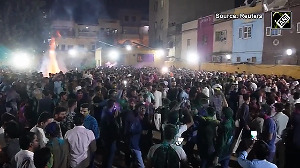A second group of 100 Indian fishermen was released from a jail in the southern port city of Karachi on Thursday as part of a move by Pakistani authorities to free 442 fishermen who have completed their prison terms.
The fishermen were released from Malir Jail this morning and set off for Lahore to be repatriated to India, prison officials said.
The fishermen are scheduled to cross over to India at the Wagah land border tomorrow. Pakistani authorities freed the first batch of 100 fishermen on August 30.
The third and fourth batches will be released on September 4 and 6. All the fishermen were arrested for violating Pakistan's maritime boundary. A majority of them were held in prison for periods of up to three years even after completing prison terms ranging from six months to a year.
Most of them hail from the coastal state of Gujarat.
The government ordered the release of 442 fishermen who had completed their prison terms after the NGOs Pakistan Institute of Labour Education and Research and Pakistan Fisherfolk Forum filed a case in the Supreme Court.
Former law minister Syed Iqbal Haider represented the petitioners in the Supreme Court. At the last hearing of the case on August 26, the apex court asked the federal Interior Ministry to explain why 456 Indian fishermen were being held in jails in Sindh province even after they had completed their prison terms.
Pakistani NGOs and rights activists like Ansar Burney have asked the Indian government to reciprocate the release of the prisoners by freeing over 100 Pakistani fishermen currently being held in Indian jails.






 © 2025
© 2025